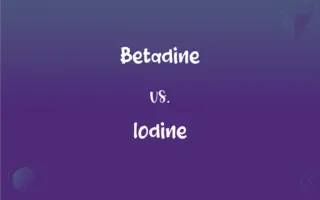Chocolate vs. Cocoa: What's the Difference?
Edited by Aimie Carlson || By Harlon Moss || Published on November 14, 2023
Chocolate is a food product made from cocoa beans; cocoa refers to the powder obtained from roasted, husked, and ground cocoa beans.

Key Differences
Chocolate is a delightful treat loved by many worldwide. Made primarily from the cocoa beans of the cacao tree, it undergoes several processing stages, from fermenting to roasting, to become the chocolate we know. Cocoa, on the other hand, specifically refers to the powder resulting from roasted, husked, and finely ground cocoa beans. This cocoa powder is a key ingredient in making various chocolate products.
The allure of chocolate is undeniable, with its varieties ranging from dark, milk to white. Its flavor profile is determined by the proportion of cocoa solids, cocoa butter, and other ingredients. Cocoa, in its pure form, is bitter and is devoid of the fats and sugars commonly found in chocolate. Many bakers and chefs utilize pure cocoa powder to impart that genuine chocolate flavor to their dishes without the additional fats.
While chocolate can be consumed in solid forms like bars, chips, or chunks, cocoa is often used in its powdered form. This powdered cocoa can be reconstituted in liquids or mixed into batters for a chocolatey flavor. Chocolate, with its varying textures and additional ingredients, can be savored on its own or utilized in countless recipes.
In the marketplace, chocolate products abound, from simple bars to intricate truffles. Each product can have differing levels of sweetness, texture, and cocoa intensity. Pure cocoa powder, however, stands alone in its robust and unadulterated chocolate flavor, often sought after for recipes requiring a deep chocolate essence without added sugars or fats.
Comparison Chart
Nature
A food product.
A powder.
ADVERTISEMENT
Origin
Made from cocoa beans.
Obtained from roasted and ground cocoa beans.
Taste
Can be sweet, bitter, or milky.
Typically bitter.
Usage
Consumed in solid forms or melted.
Used in powdered form in baking and beverages.
Composition
Contains cocoa solids, cocoa butter, and other ingredients.
Lacks the fats and sugars found in chocolate.
Chocolate and Cocoa Definitions
Chocolate
A treat made from cocoa beans with varying sweetness.
She savored the rich dark chocolate bar.
ADVERTISEMENT
Cocoa
A bitter powder from roasted, ground cocoa beans.
She added cocoa to her morning smoothie for a chocolatey flavor.
Chocolate
A mixture containing cocoa used in confectionery or cooking.
The chef used premium chocolate for the molten lava cake.
Cocoa
The basis for chocolate, devoid of fat and sugar.
Pure cocoa powder is a staple in many baking recipes.
Chocolate
A food product combining cocoa solids and cocoa butter.
White chocolate lacks the cocoa solids found in its darker counterparts.
Cocoa
A finely ground substance from the husked seeds of the cacao tree.
Hot milk with cocoa makes a comforting drink on cold nights.
Chocolate
A solid or liquid edible, often sweetened, from fermented cocoa beans.
Melted chocolate is a key ingredient in many dessert recipes.
Cocoa
A brown powder used to impart chocolate flavor in cooking.
The truffle recipe called for a cup of unsweetened cocoa.
Chocolate
A brown substance made from roasted cacao seeds.
The chocolate chunks in the cookies added a delightful texture.
Cocoa
The primary ingredient from which chocolates are derived.
Checking the cocoa content can determine the darkness of the chocolate.
Chocolate
Fermented, roasted, shelled, and ground cacao seeds, often combined with a sweetener or flavoring agent.
Cocoa
A powder made from cacao seeds after they have been fermented, roasted, shelled, ground, and freed of most of their fat.
Chocolate
A beverage made by mixing water or milk with chocolate.
Cocoa
See hot chocolate.
FAQs
What's the main ingredient in chocolate?
Cocoa beans, processed into cocoa solids and cocoa butter.
Is cocoa always bitter?
Pure cocoa is naturally bitter, but sweetness varies in chocolate products.
Can I substitute chocolate for cocoa in recipes?
It's possible but requires adjustments, given their different compositions.
Are chocolate and cocoa the same?
No, chocolate is a food product from cocoa beans; cocoa is the powdered form of the beans.
Is white chocolate genuine chocolate?
It contains cocoa butter but lacks cocoa solids, so it's a type of chocolate.
How is dark chocolate different from milk chocolate?
Dark chocolate contains higher cocoa content and lacks milk solids.
Why is chocolate so popular globally?
Its versatile flavors, textures, and mood-enhancing properties contribute to its popularity.
Why is some chocolate labeled "70% cocoa"?
It denotes the percentage of ingredients from cocoa beans in the product.
Which is healthier, chocolate or cocoa?
Cocoa, as it lacks added sugars and fats, but dark chocolate has health benefits too.
Why do some recipes call for unsweetened cocoa?
It allows for flavor control, with sweetness added separately.
What's Dutch-processed cocoa?
It's cocoa treated with an alkali, making it milder and darker.
Can chocolate be dairy-free?
Yes, dark chocolate varieties often lack dairy, but always check labels.
How is raw chocolate different?
It's made from unroasted cocoa beans, retaining more nutrients.
Is there caffeine in chocolate and cocoa?
Yes, both contain caffeine, but amounts vary based on processing and product.
Where does cocoa come from?
Cocoa is derived from the cacao tree's seeds, native to Central and South America.
Is cocoa powder used for hot chocolate?
Yes, many hot chocolate recipes use cocoa powder as the base.
Can I use cocoa to make chocolate at home?
Yes, by combining cocoa with cocoa butter and sweeteners.
Why does chocolate melt?
Cocoa butter in chocolate has a low melting point, making it melt easily.
Can cocoa be used as a natural dye?
Yes, it can impart a brown hue to foods and even textiles.
Can you be allergic to cocoa?
Yes, though rare, some people can have allergic reactions to cocoa.
About Author
Written by
Harlon MossHarlon is a seasoned quality moderator and accomplished content writer for Difference Wiki. An alumnus of the prestigious University of California, he earned his degree in Computer Science. Leveraging his academic background, Harlon brings a meticulous and informed perspective to his work, ensuring content accuracy and excellence.
Edited by
Aimie CarlsonAimie Carlson, holding a master's degree in English literature, is a fervent English language enthusiast. She lends her writing talents to Difference Wiki, a prominent website that specializes in comparisons, offering readers insightful analyses that both captivate and inform.






































































